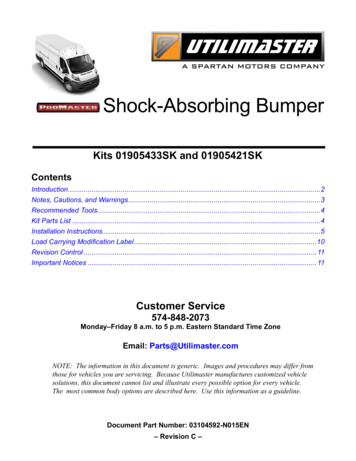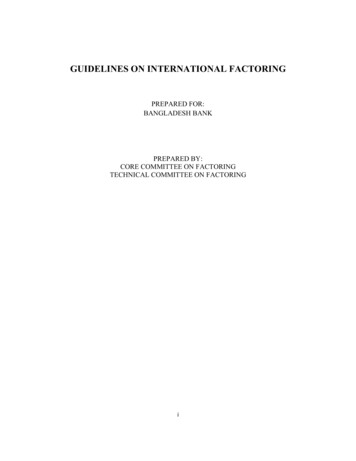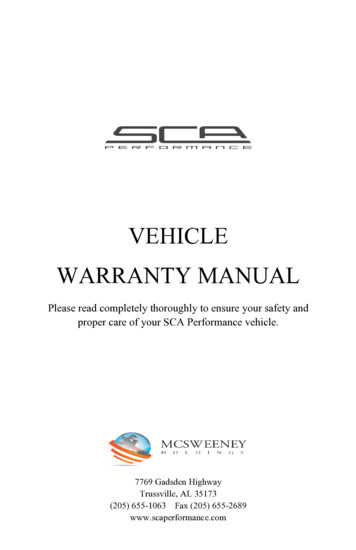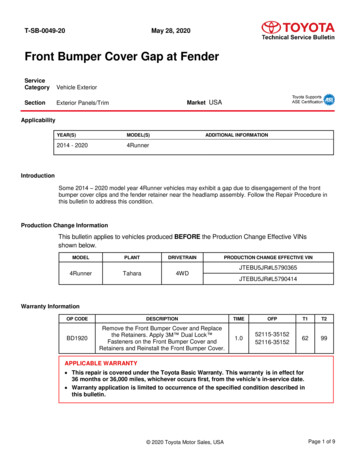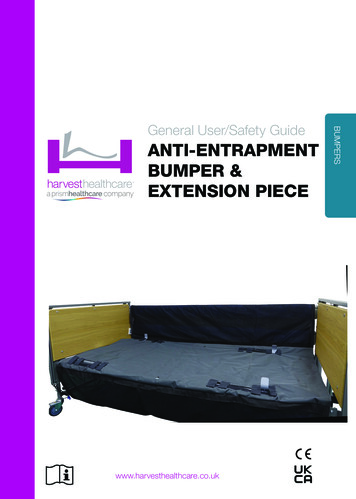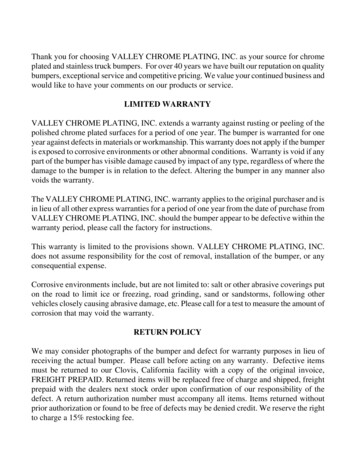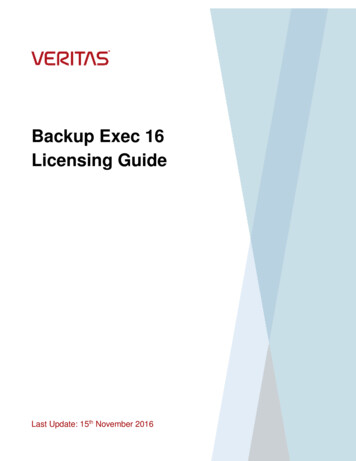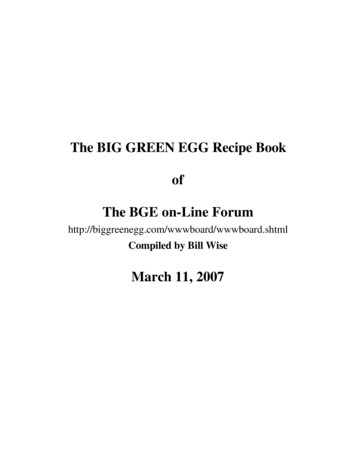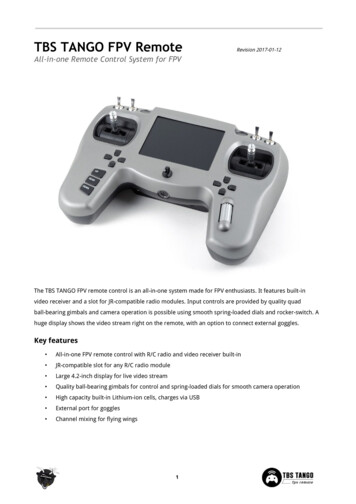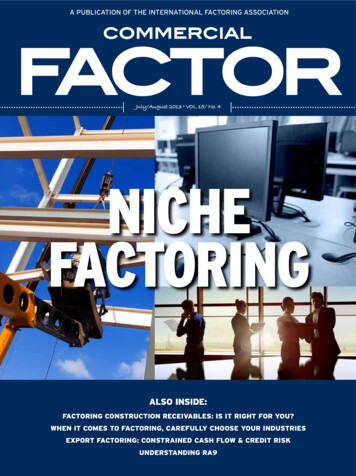
Transcription
BUMPER 2 BUMPERTOTAL VEHICLEALIGNMENTA guide created by:TBS Factoring Service
TBS Factoring ServiceBUMPER 2 BUMPERTOTAL VEHICLE ALIGNMENT.created by tbs factoring serviceTBS Factoring Service LLC is a leading company in providing factoring to growth-orientedcompanies in the transportation industry. Founded in 2004, the Oklahoma City-based companyserves thousands of clients nationwide with simple and flexible cash flow solutions.TBS Factoring is a key part of a family owned one-stop shop for independent trucking servicesthat also includes Truckers Bookkeeping Service, formed in 1968 to provide independent truckingcompanies with permitting, DOT compliance and fuel tax reporting services. In 1998, the companybegan offering truck insurance through a network of Preferred Agencies. In 2013, TBS CapitalFunding joined the TBS Family, expanding our service offering to include accounts receivablefunding and payment acceleration for businesses outside of transportation. And in 2017, TBS beganoffering logistics and disaster recovery services through Foxhole Logistics, the newest addition to theTBS family.The TBS family-ownership group has over 50 years experience serving independent truckers. Ourclients receive outstanding service from a seasoned and dependable staff. TBS Factoring Service isamong the most highly regarded freight factoring companies in the USA.let's be friends
TBS Factoring ServiceTable of Contentstable of contentsBumper 2 Bumper: Total Vehicle Alignment.1Chapter 1: It’s About Geometry.2Chapter 2: No Good Outcomes.3Chapter 3: What About The Driver?.5Chapter 4: Selecting A Quality Commercial Vehicle Alignment Shop. 6 2020 TBS Factoring Service, LLC
TBS Factoring ServiceBumper 2 Bumper: Total Vehicle AlignmentBUMPER 2 BUMPERTOTAL VEHICLE ALIGNMENTTotal vehicle alignment is often overlooked in preventive maintenance programs. Yet, total vehiclealignment plays an essential role in vehicle performance and in lowering operational costs.Nevertheless, industry estimates that 70 to 80 percent of commercial vehicles on the road today aremisaligned.Proper vehicle alignment is when a vehicle and all its tires are traveling in a straight line.Among the ways to knock a vehicle out of alignment are running over potholes, hitting curbs,bumping into concrete parking stops and vehicle wear and tear.Improper alignment negatively impacts vehicle safety, driver comfort and fuel economy, plus itshortens the life expectancy of tires.Rich benefitsTotal vehicle alignment maintenance and inspection programs pay numerous dividends: Extending tire wear for increased tire mileage. Enhancing fuel efficiency. Decreasing component wear. Reducing downtime. Improving driver comfort. Improving vehicle handling for less driver fatigue. Making vehicles safer.1
TBS Factoring ServiceChapter #1 It’s About GeometryIt’s About GeometryA vehicle not in proper alignment is a recipe for a maintenance manager’s and truckowner’s nightmare. Why? Because misalignment impacts every aspect of operatingcosts per mile.Alignment refers to the various angles of steer axle geometry and to the tracking of allaxles on a vehicle, including trailers. The objective of proper alignment is to minimizetire wear and maximize predictable vehicle handling and control.Vehicle alignment settings serve a variety of functions in vehicle operation and affect suchthings as handling, steerability, stability, performance and safety.Basically, a vehicle is a composite with the chassis as the foundation. This foundation must besquare and solid to support the dynamics of the complete structure.The chassis includes every wheel, axle, suspension component and frame member. All should be aligned inrelation to one another as a whole, instead of only one wheel or one axle independently. Total alignment is a correction of the entirevehicle geometry.Out-of-alignment occurs when the suspension and steering systems are not operating at their desired angles. When a vehicle is in totalalignment, all wheels “agree” on one direction so lateral forces do not counteract.Often, the difference between a “good” truck and a “bad” truck is simply proper alignment.What in the world is that?Here are some specific types of uncalled for tread wear caused by misalignment: Feathering – Tread ribs or blocks are worn smooth/lower on one side and higher/sharper on the other. Toe – The difference in distance apart, at the front and at the rear, of the steering axle tires when viewed from directlyabove the truck. An Out-of-spec toe-in – Fast outside shoulder wear on both steer tires because the tires are closer together in the frontthan in the rear. Toe-out – Fast inside shoulder wear on both steer tires because the tires are closer together in the rear than in thefront. (Toe settings generally have the greatest effect on truck tire treadwear.) Cupping – Also known as tire scalloping, occurs because of inconsistent, distinct high and low “cup-like” wear spots,usually around the edge of the tread on one side or the other.2
TBS Factoring ServiceChapter #2 No Good OutcomesNo Good OutcomesImproper vehicle alignment impacts the two largest maintenanceexpenditures – tires and fuel – the most. Without proper alignment,the tires will scrub across the pavement, increasing rolling resistance.Because of the lateral forces, not only is more horsepower requiredto move the same load (which directly impacts fuel consumption), buttire life is reduced, resulting in more frequent tire replacement.Such unnecessary lateral forces not only require more horsepower,but also increase fuel consumption to move the same load. Theseforces also significantly reduce tire mileage, resulting in morefrequent tire replacement.Vibrations are typically caused by out-of-round tires, driveline issues,loose bearings, balance issues or toe- or drive-axle misalignment.Performing frequent alignments provides better control over vehiclecondition and extends the life of the tires.Rolling dollars awayBecause tires are a significant financial investment for any truck/fleet owner, it is wise avoid tire issues that causebreakdowns and/or contribute to premature tire wear, which decreases casing life and reduces fuel efficiency.Among the issues to avoid: Underinflating and overinflating tire pressure. Improper toe-in or toe-out alignment. Alignment issues on trailer axles. Using the incorrect tire for the application. Mismatching tires.3
TBS Factoring ServiceChapter #2 No Good OutcomesNo Good Outcomes (continued.) Tracking – All axles must be aligned with the truck’s front axles, otherwise, the steer tires areforced to counter-steer against the direction of the rear axles. While the tractor alignment may becorrect, a trailer tracking to the right or left (referred to as dog tracking), leads to irregular trailertire wear as well as irregular wear on steer and/or drive tires. Camber – This is the tilt of the tires when viewed from the front of the truck. Positive camberis when the tires are closer together at the bottom (point of road contact), and negative camberis when the tires are closer together at the top. Positive camber causes premature treadwearalong the tire’s outside shoulder, and negative camber wears away along the inside shoulder. Ina tractor-trailer combination, the drive tires traditionally experience positive camber; trailer tires,negative camber. Caster – This is the forward or backward slope of a line drawn through the upper and lowersteering pivot points when viewed directly from the side of the vehicle. Positive caster is when theline slopes towards the rear of the vehicle at the top and negative caster is when the line slopestowards the front, Caster is normally associated with handling and driveability of the vehicle andnot tire wear problems. Negative caster will cause unstable steering, require constant steeringcorrections and render the vehicle unable to return to straight ahead out of a turn. Positive castercauses hard steering, shimmy and road shock.There’s a video for thatA series of instructional videos on commercial truck tire wear, handling, alignment and mechanical issues by alignmentspecialist Mike Beckett can be found online at: https://www.youtube.com/watch?v w fwYeGtZ4w4
TBS Factoring ServiceChapter #3 What About The Driver?What About The Driver?Improper vehicle alignment also impacts the driver. When a vehicle is notaligned, the driver must constantly correct the steering, usually in onedirection all the time. One driver described this as a form of Chinese watertorture.Additionally, a vehicle rattling, shuddering and vibrating along the roadcan cause an uncomfortable ride that contributes to driver discomfort,muscular fatigue and stress. This tires and frustrates drivers, making themless effective and productive.Driver fatigue caused by continuously correcting poor alignment canbecome a factor that impacts safety as well as the driver’s attitude.Vehicles that are difficult to handle are a reason for a driver to start lookingfor work with another company.Properly aligned vehicles are not only safer to drive; they also makedriving easier and more enjoyable.Steer tire wear and drive axlesDrive wheels carry three-quarters of all the weight on a truck. If they are not pushing in the directionyou want to the vehicle to go, that means the front end is trying to overcome engine power.Experience and studies have proven that some 70 percent of steer tire wear problems originate fromthe drive axles.A vehicle going down the road sideways negates all of the aerodynamic aids added to slice throughthe air efficiently.5
TBS Factoring ServiceChapter #4 Selecting A Quality Commercial Vehicle Alignment ShopSelecting A QualityCommercial VehicleAlignment ShopThinking about using a commercial vehicle alignment shop? Be sure toevaluate the provider’s ability to perform an accurate total vehicle alignment.So advices the Technology & Maintenance Council (TMC), North America’spremier technical society for truck equipment technology and maintenanceprofessionals.TMC recommends: Asking maintenance shops and other truck operators and owners whothey use and why. Getting references and checking them out. Asking truck dealers where they send their vehicles for alignments andwhy.How deep is it?Inspecting tires for early stage irregular wear – an indicator of alignment problems – should to be a part ofany regular preventative maintenance practice.The depth of a tire’s tread is one of the most obvious indications of its performance. Tread depth is also asafety issue and therefore subject to government regulation and inspection.As defined in Federal Motor Carrier Safety Administration (FMCSA) Regulation 393.75, Tires, any tire onthe front wheels of a bus, truck or truck tractor must have a tread groove pattern depth of at least 4/32of an inch when measured at any point on a major tread groove. The measurements are not to be madewhere tie bars, humps or stone ejectors are located.The minimum tread depth for any other wheel position is 2/32 of an inch.6
TBS Factoring ServiceChapter #4 Selecting A Quality Commercial Vehicle Alignment ShopSelecting A Quality CommercialVehicle Alignment Shop (continued . . .)TMC also suggests looking for a commercial vehicle alignment shop that: Has ASE (National Institute for Automotive Service Excellence) certifications. Offers services that often go together with alignment, such as vibration analysis, balancing, truing and suspension andspring services. Makes available value-added services like centering the steering wheel, tire rotation and vehicle pickup and delivery. Wants to be a partner and is willing to develop customized specifications for one’s operation.There’s an RP for thatThe Technology & Maintenance Council (TMC) has developed guidelines on total vehicle alignment:Recommended Practice 642B, Total Vehicle Alignment: Recommendations for Maximizing Tire and AlignmentRelated Component Life.It contains comprehensive alignment guidelines for medium and heavy duty vehicles.TMC members have access to the complete Recommended Practices Manual. Non-members can order it on theTMC website – http://www.trucking.org/Technology Council.aspx – or by phoning the organization at (703) 8381763.7
the money behind your motionTBS Factoring Service will fuel your cash flow upfront and fast! Our mostpopular program offers a low non-recourse flat rate discount.Fuel Advances are available on any load we factor.CALLvisit844-358-7744tbsfactoring.comse habla espaÑollowest rates Low Flat Rates Fuel Card Free Credit Checks Free Authority Easy Application Permits Fuel Advances Insurance Down Payment AssistanceOther Programs AvailableAll content contained in this document, including, but not limited to, text, images, links, and other formats was created, and is intended to be, for informational purposes only and does notconstitute medical advice, a medical diagnosis, or medical treatment, nor does it guarantee any specific outcome related to the subject matter. The content is not intended to be a substitutefor professional legal advice, medical advice, diagnosis, or treatment. Always seek the advice of your attorney, physician, or another qualified professional with any questions you may haveregarding the subject matter. Never disregard professional legal or medical advice or delay in seeking it because of something you have read on this content. The information and viewsexpressed herein are those of the author. TBS Factoring Service, LLC does not endorse, guarantee, or otherwise make any representation or warranty as to the content herein, including anyrepresentation as to the accuracy of the information and content. In no event shall TBS Factroing Service, LLC, nor any of its affiliates, subsidiaries, officers, directors, owners, partners, oremployees be liable or responsible, either directly or indirectly, for any damage or loss caused or alleged to be caused by or in connection with the content and information herein. Relianceon any information provided herein, or on professionals presenting content for publication to TBS Factoring Service, LLC is solely at your own risk.
And in 2017, TBS began offering logistics and disaster recovery services through Foxhole Logistics, the newest addition to the TBS family. The TBS family-ownership group has over 50 years experience serving independent truckers. Our clients receive outstanding service from a seasoned and dependable staff. TBS Factoring Service is

